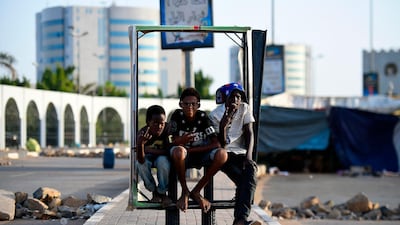Sudanese military rulers and leaders of the country's protest movement have agreed to a three-year transition period that will transfer authority to a full civilian administration.
The decision came despite talks remaining unfinished in Khartoum, where protesters have massed outside of the country's defence headquarters.
Civilians have for months called for new rule in Sudan after decades living under deposed President Omar Al Bashir. The generals who ousted him have held on to the leadership of the country.
The two sides announced early Wednesday after nearly 12 hours of negotiations that they had reached an agreement on the transition period.
"We agreed on a transitional period of three years," Lieutenant General Yasser Al Atta, a member of the military council told reporters.
Mr Atta said a final agreement on the sharing of power, including the forming of the next ruling body — the sovereign council — will be signed with the protest movement, the Alliance for Freedom and Change, within a day.
"We vow to our people that the agreement will be completed fully within 24 hours in a way that it meets the people's aspirations," Mr Atta said.
He said of the transition period, the first six months will be allocated to signing peace accords with rebels in the country's war zones like Darfur, Blue Nile and South Kordofan.
UAE Minister of State for Foreign Affairs Dr Anwar Gargash welcomed the news, saying the agreement had put Sudan "on the path of stability and recovery".
The army generals had initially insisted on a two-year transition period, while the protest leaders wanted four years.
Key negotiations however remain on the composition of the sovereign council, which will replace the existing ruling body made up solely of generals.
The generals say this should be military led while protest leaders want it to be majority civilian.
After the forming of the sovereign council, a new transitional civilian government will be formed to run the country's day-to-day affairs and would work towards having the first post-Bashir elections after the end of the transition period.
Mr Atta said that during the transition period parliament will be composed of 300 members, of which 67 per cent will be from the Alliance for Freedom and Change and the rest will be from other political groups.
The Alliance for Freedom and Change meanwhile said the shootings on Monday were an attempt to "disturb the breakthrough" in talks.
On Tuesday, the US blamed the army for the deaths.
They "were clearly the result of the Transitional Military Council trying to impose its will on the protesters by attempting to remove roadblocks", the US embassy said on its Facebook page.
"The decision for security forces to escalate the use of force, including the unnecessary use of tear gas, led directly to the unacceptable violence later in the day that the TMC was unable to control," it said.

